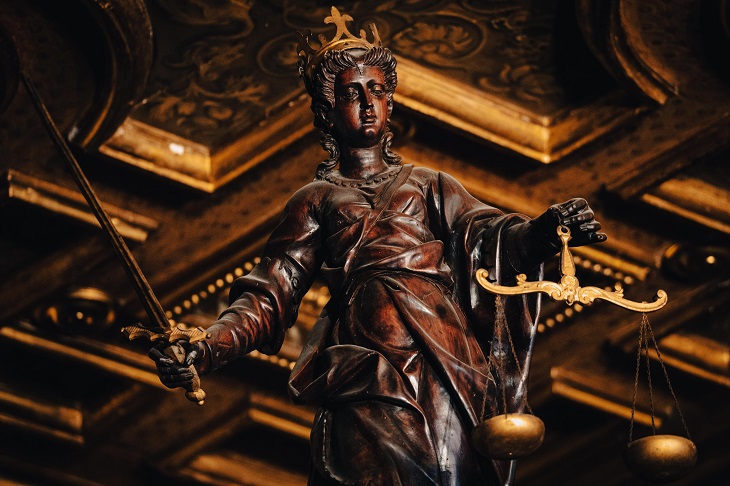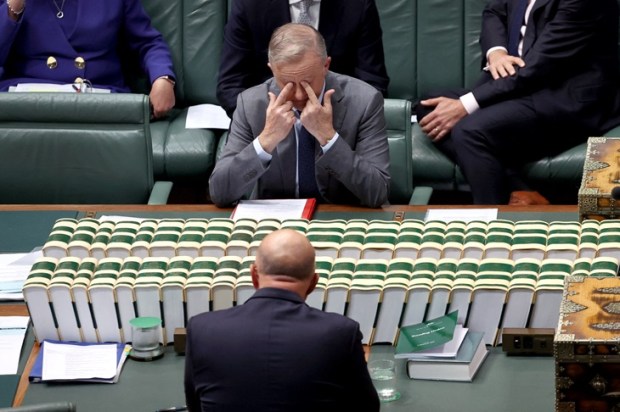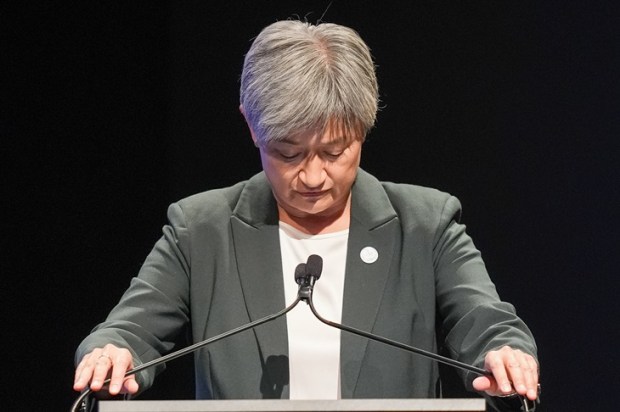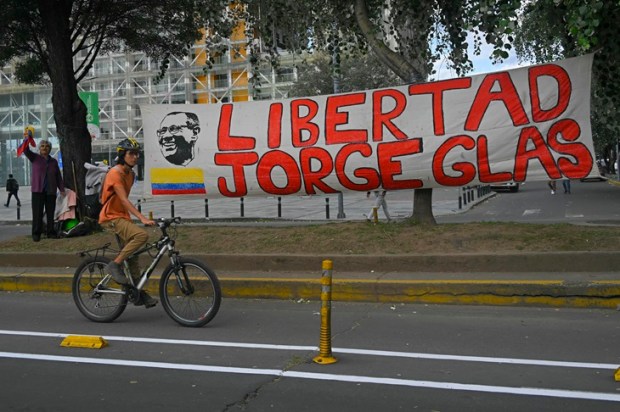It began when the lawns atop Parliament House were fenced off. The whole point of the design of Parliament House was to enable the physical and symbolic act of the people walking over the Parliament as a reminder that our elected representatives are beneath the people. Parliamentary sovereignty in Australia means that the people are sovereign. Since, however, Australia has been on a crash course to diminish the sovereignty of the people as technocrats incrementally grab more power. And we are letting it happen.
In Robert Bolt’s play A Man for All Seasons, Sir Thomas More argues with his potential son-in-law that even the devil himself should be treated in accordance with the rule of law:
William Roper: ‘So, now you give the Devil the benefit of law!’
Sir Thomas More: ‘Yes! What would you do? Cut a great road through the law to get after the Devil?’
William Roper: ‘Yes, I’d cut down every law in England to do that!’
Sir Thomas More: ‘Oh? And when the last law was down, and the Devil turned ‘round on you, where would you hide, Roper, the laws all being flat?’
In my honours thesis, I argued (rather poorly) the case for a bill of rights for Australia, along the lines of the American Bill of Rights, because there is a distinct lack of liberties enshrined in our Constitution (that big admin document that largely outlines our customs union). Even the word ‘citizens’ is not mentioned except in relation to being a citizen of somewhere else. At the time I was arguing for a bill of rights, conservatives thought any bill of rights should also contain a bill of responsibilities. I thought we had so many laws outlining our responsibilities that a bill of rights would give us at least some legal standing that was not subject to the whim of convention. In hindsight, a bill of rights might have been handy during the pandemic. But I digress.
When travelling overseas, even in Syria (before the war), I felt free to do whatever I liked except to speak poorly of the country’s rulers. In Australia, I could speak poorly of the government, but almost every other action was highly regulated. We have political freedoms (unless we fail to vote and then we get fined) but everything else is regulated by technocrats. I became conscious of the different types of freedom one day in Shanghai Airport as I watched a young man skate past my gate on his longboard. As there were no signs or rules about not skateboarding in the airport, the Chinese police did not even blink as he rolled on by. If that had happened at Mascot, the kid would have been crash-tackled by the Australian Federal Police as a matter of principle. Freedom is relative, it seems.
But that was before the geopolitical situation had changed, and before Woke was a thing. Now I am finding that our freedoms, enshrined in Westminster’s liberal-conservative tradition, are under attack. The people are not really sovereign, and the rule of law is closer to rule by lawyers. There have been numerous events in the last few years that point to the sovereignty of the technocrat that should send a shiver down the spine of every self-respecting liberal democrat.
Before the pandemic, I deliberately voted to support Gladys Berejiklian to remain as Premier of NSW. A female premier who was also a very good premier but didn’t fit the Woke mould. On October 5, 2021, she resigned because three unelected lawyers announced she was under an investigation that has still not led to a conviction or a charge or anything and was enough to overthrow the premier I voted for. The NSW ICAC is not elected, and its history of bringing down premiers who were elected by NSW citizens (even though the politicians were never charged or convicted of corruption) demonstrates the level of politicisation of both the process and the outcome of anti-corruption commissions. In 2015, the High Court found that the NSW ICAC had exceeded its authority and misinterpreted its powers. In any event, duly elected premiers and senior ministers have been put into the embarrassing position of having to resign based on a whim rather than a charge or conviction.
In the recent Victorian election, both Daniel Andrews and Matthew Guy were subject to scrutiny by Victoria’s IBAC (the equivalent of NSW’s ICAC). Neither of them resigned and nobody knows what is going on there, but for whatever reason, Victoria’s IBAC doesn’t appear to have the same reputation-killing capability as the NSW ICAC. Yet IBAC remains a Sword of Damocles just waiting to oust the voter’s choice if the lawyers can publicly dig up enough mud to stick to the proverbial blanket.
Following Scott Morrison’s bizarre (I used that term before the inquiry did) multi-ministry shenanigans, he was removed at the election because he was on the nose with voters. Even Labor knew they didn’t ‘win’ the election. Morrison lost it. But then the voters’ decision was not good enough, and another lawyer had to be brought in to say that Scott Morrison was naughty. Morrison didn’t break the law, he was not charged or convicted, but he was censured by the House of Representatives (quelle surprise!) just so that voters knew that their authority to remove Morrison was not good enough for the technocrats.
And rather than update the Cabinet handbook or some other such simple measure, the entire Westminster tradition that has enabled strong yet flexible government for centuries was turned into a technocratic lawyer-fest with new laws to ensure that politicians can flail their opponents even after the sovereign people have removed their trust and peacefully overthrown the previous leader.
With a bit of luck, the National Anti-Corruption Commission will do to Anthony Albanese what the NSW ICAC did to Nick Greiner. Perhaps then the Wokerati will see the folly of their ways, but I won’t be holding my breath.
One could be forgiven for believing that the role of the police, rather than unelected lawyers, is to investigate criminal behaviour and charge those who are corrupt. The police would usually do this on the basis of those charged remaining innocent until proven guilty. It’s this age-old custom called the rule of law, and it operates amid some level of separation of powers between the executive (in this case, the police), the legislature (Parliament), and the judiciary (the courts).
In my experience, judges are the most remarkable beings, held in check by age-old customs and a peer group that makes it very difficult to step out of line. To be sure, judicial activism can and does happen, but that means our elected representatives need to ensure the intent of the laws they draft are as clear as possible. Let’s just say it’s no mean feat, but it is part of the job in politics and the law. The rule of law requires those in positions of responsibility in the legal profession to be impartial towards both complainants and defendants. Much like Weber’s concept of the impersonal and impartial bureaucracy, the system is the best that humans have devised to make things as fair as possible. Until now.
In the so-called Fourth Estate, journalists are meant to stand up for the common people. Leigh Hunt, the Barbadian-English journalist, and friend of Percy Shelley, was the quintessential journalist whose legacy is freedom of the press. He might have become a celebrity had he journeyed with Shelley on that fateful day. But today’s journalists are unlikely to spend time in jail to ensure freedom of the press, rather many have become celebrities who, often using public funds, pursue their own agendas in a way that put themselves above the people they are supposed to defend.
Recent legal goings-on involving an alleged rape demonstrate the extent of the decay of our Westminster and rule of law systems. The technocrats of the Wokerati are more like a Fifth Column than the Fourth Estate. And this is affecting the so-called sovereign people and the efficacy of their political powers.
For all the censuring with my face I can muster, it won’t make a lick of difference unless Australians are awake to (rather than Woke to) the dangerous and uncharted waters we are navigating as we cede more and more of our political power to technocrats. We have already set dangerous precedents that give unelected lawyers the power to overthrow governments using public hearings which forgo the age-old convention of innocent until proven guilty. But now these same lawyers are making public statements that effectively convict people in the musings of the Fifth Column, sorry, the media, and therefore make a mockery of the rule of law.
In our political system, all Australians are sovereign, at least for now. Rather than cutting down the rule of law to get at the devil, perhaps it’s better the devil is required to abide by the rule of law. And that includes lawyers.
Got something to add? Join the discussion and comment below.
Get 10 issues for just $10
Subscribe to The Spectator Australia today for the next 10 magazine issues, plus full online access, for just $10.


























Comments
Don't miss out
Join the conversation with other Spectator Australia readers. Subscribe to leave a comment.
SUBSCRIBEAlready a subscriber? Log in